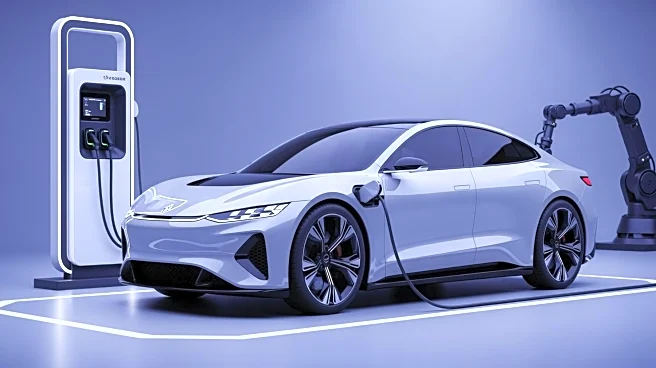What's Happening?
Tesla has announced a fourth consecutive quarterly decline in profit despite an increase in sales. The company's third-quarter earnings fell by 37% to $1.4 billion, or 39 cents per share, compared to $2.2
billion, or 62 cents per share, a year earlier. This decline in profit comes as Tesla's revenue rose to $28.1 billion from $25.2 billion, driven by a surge in electric vehicle sales and battery storage and charging businesses. The increase in sales was partly due to customers rushing to take advantage of a $7,500 federal EV tax credit before its expiration on October 1. Tesla's shares fell 3.5% in after-hours trading following the announcement. CEO Elon Musk highlighted the company's focus on diversifying its business, particularly through its driverless robotaxi service and AI products, including Optimus robots for homes and factories.
Why It's Important?
The decline in Tesla's profit amidst rising sales underscores the challenges the company faces in maintaining profitability while expanding its business operations. The expiration of the federal EV tax credit may impact future sales, posing a potential risk to Tesla's revenue growth. Musk's emphasis on diversifying Tesla's business through robotaxi services and AI products reflects a strategic shift that could redefine the company's market position. However, the uncertainty surrounding demand for electric vehicles and competition from rival EV makers remains a concern. Tesla's ability to innovate and introduce new models at competitive prices will be crucial in sustaining its market share and achieving long-term growth.
What's Next?
Tesla plans to expand its robotaxi service to up to 10 metro areas by the end of the year, starting with Austin, Texas, and San Francisco. Musk expressed confidence in removing safety monitors from the driver’s seat, indicating a significant step towards fully autonomous vehicles. The company’s focus on AI and robotics could lead to new product offerings and revenue streams, potentially offsetting the challenges in the EV market. Stakeholders will be closely monitoring Tesla's ability to execute these plans and the impact on its financial performance.
Beyond the Headlines
Tesla's strategic shift towards AI and robotics raises ethical and regulatory considerations, particularly concerning the deployment of autonomous vehicles and robots. The company's expansion into these areas may prompt discussions on safety standards, privacy concerns, and the impact on employment in traditional sectors. As Tesla continues to innovate, it may influence broader industry trends and regulatory frameworks, shaping the future of transportation and technology.











